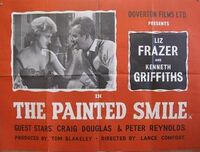The Painted Smile: Difference between revisions
No edit summary |
No edit summary |
||
| Line 1: | Line 1: | ||
[[Category:Influences on Morrissey - Film and Television]] | [[Category:Influences on Morrissey - Film and Television]] | ||
[[File:The Painted Smile (1962).jpg | 200px | right | thumb |The Painted Smile poster]] | |||
== Relevance == | == Relevance == | ||
This film features in [[Mention::Autobiography]]'s list of "social films of lost Sunday television": | This film features in [[Mention::Autobiography]]'s list of "social films of lost Sunday television": | ||
Latest revision as of 20:56, 26 February 2023
Relevance
This film features in Autobiography's list of "social films of lost Sunday television":
"The shadowy social films of lost Sunday television are Oliver Twist (1948) (in which career-criminal Bill Sikes says ‘There’s light enough for what I ’ave to do!’), London Belongs to Me (1948), The Blue Lamp (1950), I Believe in You (1952) and Sapphire (1959). In The Painted Smile (1962), the statuesque womanhood of comely Liz Fraser attempts to frame an uncomplicated Tony Wickert for the murder of her boyfriend in the recurring British theme of happiness not to be found."
Wikipedia Information
 |
The Painted Smile (US title: Murder Can Be Deadly) is a 1962 British second feature thriller film directed by Lance Comfort and starring Liz Fraser, Kenneth Griffith, Peter Reynolds and Tony Wickert.
